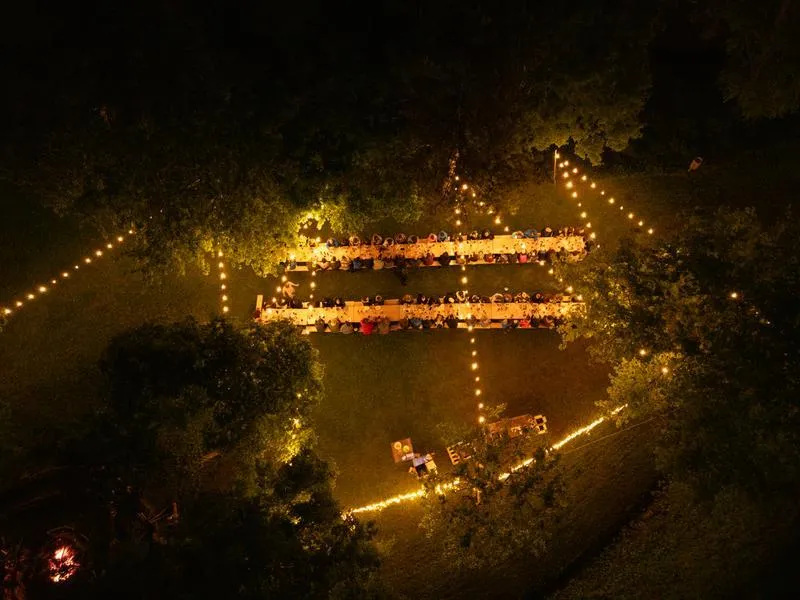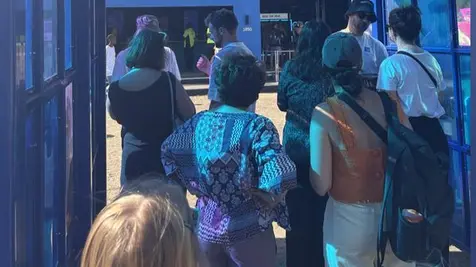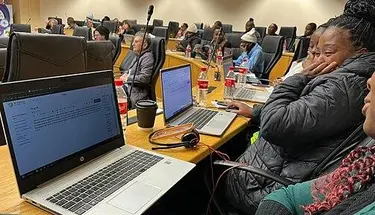🎧 Listen to the Article
This audio is AI-generated for accessibility.
Key Highlights
A few days, over a hundred strangers, and one shared vision: Let’s Tribe is redefining what it means to belong—through nature, simplicity, and community.
Can a community be created among strangers of different backgrounds in just a few days?
This is probably the question that crossed the minds of the organizers of Let’s Tribe, “an idea born around a campfire among seven friends, Keepenchanted, Upendovibes, and Zenithvan, from the desire to share beauty, simplicity, and experiences,” as stated on their official page.
The aim is to create a shared experience that brings together travelers, campers, van-lifers, and digital nomads into one big tribe.
We were incredibly lucky to take part in the fourth edition of this fantastic initiative. This edition took place at Rifugio Valnera, a stunning location in the mountains of upper Tuscany (Marradi), near the border with Emilia-Romagna.
Surrounded by uncontaminated nature, with only one Wi-Fi point and finally disconnected from daily anxieties and the pressure of constant social sharing, over a hundred people experienced something truly unique.
Right from arrival, participants were warmly greeted by the organizers, who handed out personalized welcome kits with both fun and practical items: a flashlight, a carabiner, along with hats, bandanas, mugs, and more. Not even the weather could discourage them—they patiently helped almost every attendee park their campers, vans, and even a converted school bus in the muddy terrain.
Let’s Tribe is made up of shared moments and collective experiences, built around a rich schedule of activities tailored for the “tribers.”
Morning and sunset yoga sessions offered opportunities for inner connection, while guided hikes and nature walks helped explore the untouched landscape of upper Tuscany—forests, streams, and breathtaking views. Every activity became a chance to engage with the surroundings and strengthen the bond between participants and the place hosting them.
But above all, it was the moments of social connection that truly solidified the group spirit—like the communal dinners. After all, what better way is there to foster community than sharing a warm meal at the same long table?
The openair show-cooking became a stage of storytelling and shared enthusiasm. The wise cooks spent hours preparing meals, engaging with participants and elevating the experience. On the first night, a rich seafood paella was served; on the second, a very scenic barbecue – with vegetarian options available.
Each evening also featured spaces for discussion, thanks to guest speakers who shared their travel experiences and life choices.
On the first night, Francesco Morelli shared how he decided to follow his growing dissatisfaction with routine and found his path through travel.
It’s far from an easy topic: it takes courage to leave a permanent job—especially in the challenging context of the Italian job market, and even more so for someone from southern Italy.
Francesco, originally from the charming island of Ischia, grew up with the cultural ideal of job security ingrained in him by both his parents and society at large.
It’s a generational legacy—parents who began working young and under precarious conditions projected onto their children a deep desire for stability, as traditionally defined.
Yet, Francesco told us, with great sensitivity, how his mother came to understand and support his brave decision. She accepted his personal, deeply individual concept of happiness and authentic joy—a choice grounded in travel and communal sharing.
On the second night, Francesca Giustini presented the second episode of a mini-documentary about her journey to Ethiopia’s Omo Valley, where she explored and documented life within tribal communities.
Again, the subjects addressed were anything but simple. This episode focused on the rituals that define life in these tribes—like bull jumping, a coming-of-age ceremony where young men leap across the backs of lined-up cattle.
But more striking were the surrounding rituals—such as the flagellation of women. In this ritual, women plead to be whipped as a show of affection and support for the young man, bearing the scars as marks of honor and sacrifice.
These are undeniably complex practices, often debated or criticized by outsiders. But one cannot overlook their deep symbolic meaning within their tribal context—rituals that shape identity, belonging, courage, and family bonds.
It’s easy to feel conflicted when faced with such practices. That’s exactly what made Francesca’s intervention so powerful—her invitation to approach radically different cultures with respect and an open mind.
This doesn’t mean we should suspend all judgment or become indifferent to our own ethical values—indeed, I myself struggled watching something so distant from my own values. But this approach calls for an awareness that our reactions toward diversity are deeply shaped by our cultural upbringing.
It requires an immense effort to distance ourselves from our own mindset and try to look with different eyes. In the end, that’s one of the core meanings of “the tribe”: to encourage conscious travel and respect for diversity, the essential foundation of community.
So, with activities, hikes, shared meals, and nature, the fourth edition of Let’s Tribe came to an end.
“Gratitude” is probably the word that best captures what this brief gathering left in the hearts and lives of its participants.
And yet, other words from different cultures come to mind.
The Japanese might say komorebi—literally, “sunlight filtering through leaves,” poetically used to describe moments of shared peace in nature.
Or from Africa, ubuntu, a word in the Bantu language evoking the ideal of shared humanity—a sense of unity and kindness among people, based on the idea that we are all connected through mutual exchange.
These concepts are distant from today’s frenetic, alienating lifestyles—dominated by consumerism and a productivity cult, obsessed with individualism, yet leaving people ever more disconnected from themselves.
That’s why experiences like Let’s Tribe matter: they help us reconnect with essential values—both individually and as a society.
So, can a sense of community and belonging be created among a group of strangers in just a few days?
The organizers succeeded in doing just that.
The answer is yes.



